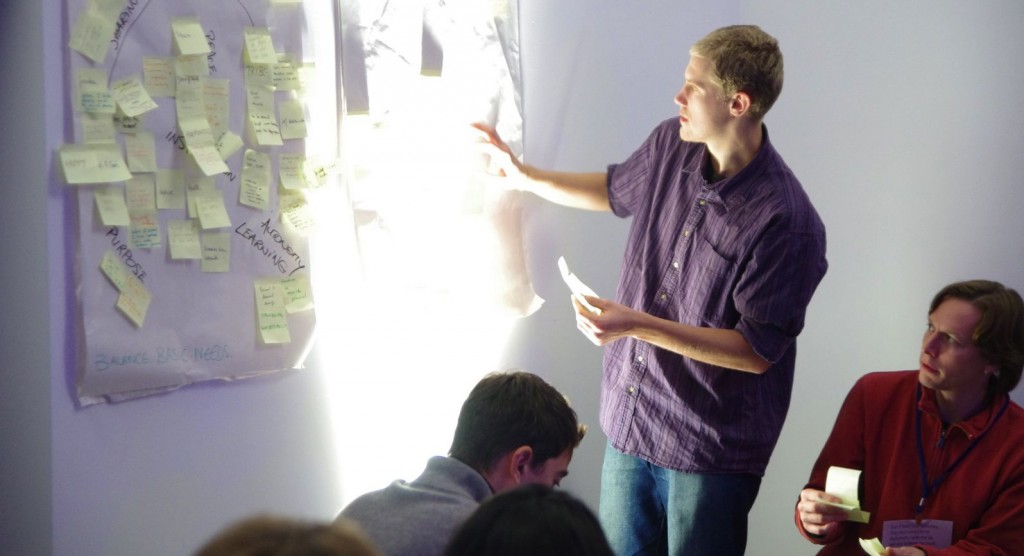
I learned much at Living On The Edge 2 – and I am not alone: the conference got lots of love from all kinds of direction. The Edgeryders community has developed an ease of collaboration, and a method for it, that make it not only inspiring, but highly productive as well. As too seldom in the past, I find in Edgeryders extreme variety (we come from over 20 countries and from all walks of life) combined with a common language that makes interaction as effortless as it gets. For example, as soon as a conversation between more than four people takes off, someone opens a PiratePad, shares the link on Twitter, and people start collaborately taking notes without anyone even needing to agree to. In such an environment, it is not only easier to come up with fresh ideas; getting down to feasibility and moving towards execution is easier too.
Among the many good things that happened at #LOTE2 is that three ideas proposed by members of the community have been developed into the shape of projects, and were subsequently entered into the European Social Innovation Prize. I am especially happy with this, because I am one of its judges and it is in our best interest to get many high-quality entries. The projects are:
- The Social Capital for Social Ventures (SC4SV), led by Nadia El-Imam and Vinay Gupta. The idea is to mobilize non-monetary inputs towards social business creation: “By putting time and specialized skills (like language or design skills) at the disposal of new small enterprises, we take what we have (skills, time and talent) and use it to fill in the gaps left by what we don’t have: access to investments of financial capital. This is self-help into employment for a largely unfunded generation.”
- The Edgeryders Knowledge Integration Program (EKIP), led by James Wallbank. The idea is to teach each other to develop locally sustainable businesses: “Participating EKIP initiatives [in the UK, Germany, Poland and Italy] have developed grassroots responses to local economic and social challenges, and are building sustainable business models based on their particular insights. Common factors include a strong engagement with information communication technologies, facilitation of peer-learning and co-working methodologies, flexibility to specific local conditions, and structural independence from large scale institutions.”
- The unMonastery, led by Ben Vickers. The idea is to redeploy monastic life as a template for collaboration and innovation: “We’re working together to develop a new kind of social space that combines the best of hackspaces with a living environment, the primary function aims to actively serve the buildings local community.”
I am very proud of this last gift from the Edgeryders project. And I am even prouder that all this innovative impetus comes from an initiative by a public international institution – the Council of Europe – that, with courage and coherence, stood for its role in facilitating and empowering its citizens, including the most radical ones, the most difficult to fit in the traditional European representation ritual. Let’s hope for more of this in 2013.
AFAIK there were at least two more projects submitted by Edgeryders people, including my own project of hemp reintroduction as a way for rural areas redevelopment. So indeed, the inspiration was strong.
To me, the most inspirational was by all means the whole discussion about The Commons – which led me in turn towards redefining the whole FreeLab proposal for the communities we work with. And that is why am going to make P2P and the Commons our leading political motif at least for the 2013.
Petros, this is great! Do you have a link to your project anywhere? And what is the other one you mention? Is it Karen’s Baumhaus?
We also participated with “Das Baumhaus”, a project started in Berlin and part of the community since #LOTE2… A public space as a social and professional networking hub in the form of an indoor tree house where people can meet to engage with each other in creative collaborations for a better world, making it fun and inclusive. http://www.baumhausberlin.de
Thanks for this, Karen, it makes the track record of Edgeryders as incubator of social innovation projects even more impressive. I have quickly checked your website, and it seems impressive – you even managed a successful crowdfunding campaign, it seems! How did that go? Would you be up for sharing your experience with the community?
of course! what would be the best way?
The best way would be to write a blog post in English for the Edgeryders blog.
And more from Edgeryders folks: I participated in writing these two entries sent to the EU Social Innovation Competition 2013.
— “Swarm power for Microenterprises.” An innovative collaboration portal & software for startup companies where they can crowdsource talents, share risks, and form larger “virtual enterprises”. This will reduce or eliminate the unmet capital needs of startups, enabling more of them to succeed. Developed mainly by a brother of mine. Site not public yet because it’s pre-release … but coming soon.
— “Economy is an App – Starting a Local Economy with the Push of a Button.” This is the more experimental one of the two 😉 but since it’s quite a long-going idea I just had to enter it as well … It’s detailed to some extent at http://ma.juii.net/blog/local-resource-infosystem (partially outdated). The basic idea is to tackle the problem of economic deadlock (like we have in Spain / Greece) at local level, with a smartphone app providing a self-organizing alternative economy marketplace that is based on mutual credit currencies (IOUs). Includes inspirations from Arthur’s talk “State Services in a Box” from LOTE1, I guess 🙂 App includes big green “Start the Economy” button.